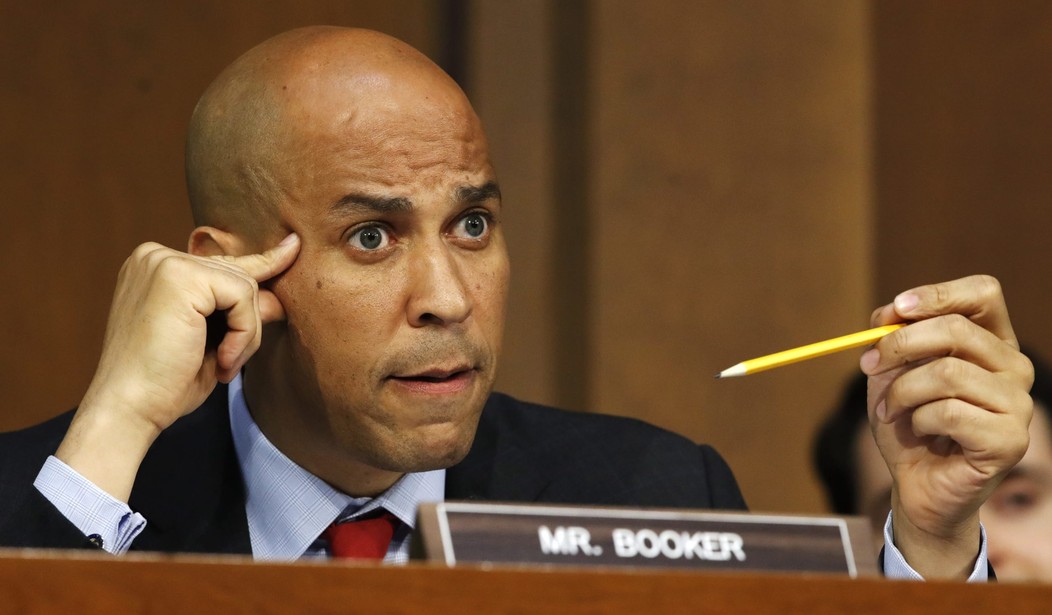A witness has emerged with allegations of teenage sexual misconduct against Senator Cory Booker (D-NJ), and that witness is — surprise! — Senator Cory Booker. Columns detailing his misconduct, written by Booker in the student-run Stanford Daily newspaper in 1992, were first unearthed by the Daily Caller in 2013. They became an issue again this month after the senator became one of the leading Democratic voices against Kavanaugh’s confirmation.
Earlier this month, Booker launched his 2020 presidential bid during a Judiciary Committee hearing where he awkwardly likened himself to Thracian gladiator Spartacus. This Friday, the senator awkwardly decried the “pernicious patriarchy” surrounding California professor Christine Blasey Ford’s accusations of sexual assault against Supreme Court nominee Judge Kavanaugh.
“In the United States of America right now, there are dark corners of our culture. The Center of Disease Control reports ‘one out of every three American women will experience some form of sexual violence,'” Booker intoned, adding that “60 percent of them go unreported.”
One instance of underage sexual misconduct in 1984 did go reported, however — by Booker himself. In a column in the student-run Stanford Daily newspaper in 1992, Booker admitted to taking advantage of an intoxicated classmate.
“New Year’s Eve 1984 I will never forget. I was 15. As the ball dropped, I leaned over to hug a friend and she met me instead with an overwhelming kiss. As we fumbled upon the bed, I remember debating my next ‘move’ as if it were a chess game,” Booker wrote:
“With the ‘Top Gun’ slogan ringing in my head, I slowly reached for her breast. After having my hand pushed away once, I reached my ‘mark,’” he continued, without explaining what he meant by “mark.”
“Our groping ended soon and while no ‘relationship’ ensued, a friendship did. You see, the next week in school she told me that she was drunk that night and didn’t really know what she was doing,” he added.
Booker’s intent of the column was to detail his transformation from a 15-year-old who was “trotting around the bases and stealing second” to someone who was called a “man-hater” over his pro-women views.
Booker returned to the subject of “date rape” a few months later:
“But by my second column, as I raised my noble pen to address the issue of date rape, I realized that the person holding it wasn’t so noble after all,” he wrote. “With this issue as with so many others, a dash of sincere introspection has revealed to me a dangerous gap — a gap between my beliefs and my actions.”
The columns were written by Booker when he was an undergraduate at Stanford majoring in sociology.
Booker has called the uncorroborated accusations against Kavanaugh, which the judge has emphatically denied, “serious, credible, and deeply troubling” and called for an FBI investigation before holding a hearing.
NJ.com columnist Paul Mulshine suggested Thursday that Booker’s old columns seem a tad hypocritical given Booker’s grandstanding over Kavanaugh’s nomination to the Supreme Court.
“Based on that Stanford Daily column, Booker should be giving Kavanaugh the benefit of the doubt as well. The point of it was that the future senator had ‘a wake-up call’ and decided ‘I will never be the same,’” Mulshine wrote.
Booker’s office pushed back in a strong statement to Fox News:
“This disingenuous right-wing attack, which has circulated online and in partisan outlets for the past five years, rings hollow to anyone who reads the entirety of Senator Booker’s Stanford Daily column,” a spokesperson said.
“The column is in fact a direct criticism of a culture that encourages young men to take advantage of women — written at a time when so candidly discussing these issues was rare — and speaks to the impact Senator Booker’s experience working to help rape and sexual assault survivors as a college peer counselor had on him.”









Join the conversation as a VIP Member